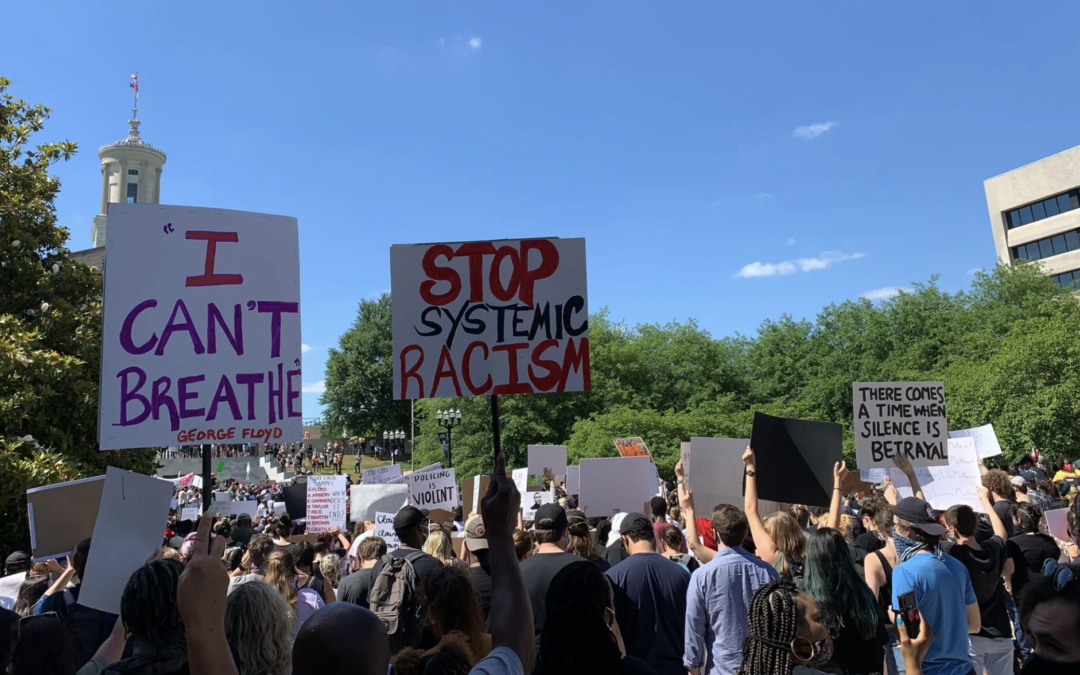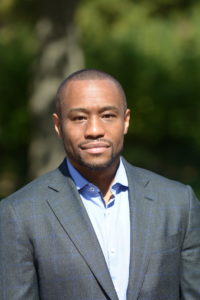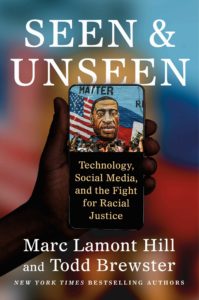
by Maina Mwaura, Urban Faith Contributing Writer | Jul 13, 2022 | Commentary, Headline News, Social Justice |
The unjust killings of African Americans at the hands of law enforcement over the past several years have become all too common news. But New York Times bestselling author Marc Lamont Hill and his co-author Todd Brewster masterfully weave together the strands of social justice uprisings, technology, and social media to talk about how the deaths of black people by police led to viral and physical social justice movements that have reshaped our national discourse.
UrbanFaith contributor Maina Mwaura spent a few moments with Marc Lamont Hill to discuss his the new book Seen & Unseen: Technology, Social Media & the Fight For Racial Justice. The full interview is above. More about the book is below.
 With his signature “clear and courageous” (Cornel West) voice Marc Lamont Hill and New York Times bestselling author Todd Brewster weave four recent pivotal moments in America’s racial divide into their disturbing historical context—starting with the killing of George Floyd—Seen and Unseen reveals the connections between our current news headlines and social media feeds and the country’s long struggle against racism.
With his signature “clear and courageous” (Cornel West) voice Marc Lamont Hill and New York Times bestselling author Todd Brewster weave four recent pivotal moments in America’s racial divide into their disturbing historical context—starting with the killing of George Floyd—Seen and Unseen reveals the connections between our current news headlines and social media feeds and the country’s long struggle against racism.
For most of American history, our media has reinforced and promoted racism. But with the immediacy of modern technology—the ubiquity of smartphones, social media, and the internet—that long history is now in flux. From the teenager who caught George Floyd’s killing on camera to the citizens who held prosecutors accountable for properly investigating the killing of Ahmaud Arbery, ordinary people are now able to reveal injustice in a more immediate way. As broad movements to overhaul policing, housing, and schooling gain new vitality, Seen and Unseen demonstrates that change starts with the raw evidence of those recording history on the front lines.
In the vein of The New Jim Crow and Caste, Seen and Unseen incisively explores what connects our moment to the history of race in America but also what makes today different from the civil rights movements of the past and what it will ultimately take to push social justice forward.

by Alejandra Molina, RNS | Jan 12, 2022 | Commentary, Headline News |

LOS ANGELES (RNS) — The Rev. Al Sharpton, speaking at the funeral of the 14-year-old fatally shot by a Los Angeles Police Department officer, recalled coming to Los Angeles 30 years ago to protest the beating of Rodney King by police.
“We keep seeing LAPD get it wrong. And here we are again. How long will it take for you to get it right?” Sharpton asked.
Valentina Orellana Peralta was with her mother, Soledad Peralta, on Dec. 23 in the dressing room of a Burlington clothing store in the San Fernando Valley’s North Hollywood neighborhood when, according to news reports, LAPD officer William Dorsey Jones Jr. fired at a 24-year-old man identified as Daniel Elena Lopez, who had been assaulting a woman in the store. The officer’s shots killed Lopez, and Valentina was also killed when one of the bullets went through a wall.
Both the girl and her mother had come to the United States from Chile.
Sharpton, on Monday (Jan. 10), eulogized Orellana Peralta, who was displayed in a pink dress inside a flower-draped casket during her funeral at City of Refuge, United Church of Christ in Gardena, near Los Angeles.
Today I’m eulogizing 14-year-old #ValentinaOrellanaPeralta who was killed by a LAPD stray bullet as she shopped for a Christmas dress. I’m praying for her parents and loved ones and we will seek justice in her name
 @rachelnoerd pic.twitter.com/NPyYj3lDhu
@rachelnoerd pic.twitter.com/NPyYj3lDhu
— Reverend Al Sharpton (@TheRevAl) January 10, 2022
“There is nothing normal about shooting so recklessly that a young teenage girl looking to live the American dream, that was shopping with her dear mother Soledad, possibly getting a Christmas dress, ends up being dressed for her funeral,” Sharpton said. “This could have been my daughter. This could have been your daughter.”
The shooting made international news when President Joe Biden called Chilean President-elect Gabriel Boric to congratulate him on winning his country’s election and during that conversation, “offered his deep condolences to the people of Chile for the tragic death” of Orellana Peralta.
Orellana Peralta was remembered as a happy teen who excelled in school, who was an advocate for animals and who yearned to become a U.S. citizen. Her father said she had dreams of becoming an engineer to build robots.
Sharpton, during the eulogy, said it was important to make it clear that “we don’t just fight for our own because we all are our own,” Sharpton said.
“Whether you are from South Central, Harlem, or Chile, right is right … If we call for justice for some, we must call (for) it for all, and I wanted to come 3,000 miles to say, ‘Justice for (Valentina)!’” Sharpton proclaimed.
Added Sharpton: “There are those … around America that talk about refugees coming to America, some from Chile, some from Central and South America, some from Mexico, and they ask me why I stand and fight for them to have rights. I fight for them to have rights because I worship a refugee from Bethlehem.”
“Jesus was a refugee, and you cannot despise refugees and then stand up and say you are a believer in Christ,” he said.
The Associated Press contributed to this report.

 With his signature “clear and courageous” (Cornel West) voice Marc Lamont Hill and New York Times bestselling author Todd Brewster weave four recent pivotal moments in America’s racial divide into their disturbing historical context—starting with the killing of George Floyd—Seen and Unseen reveals the connections between our current news headlines and social media feeds and the country’s long struggle against racism.
With his signature “clear and courageous” (Cornel West) voice Marc Lamont Hill and New York Times bestselling author Todd Brewster weave four recent pivotal moments in America’s racial divide into their disturbing historical context—starting with the killing of George Floyd—Seen and Unseen reveals the connections between our current news headlines and social media feeds and the country’s long struggle against racism.


 @rachelnoerd
@rachelnoerd